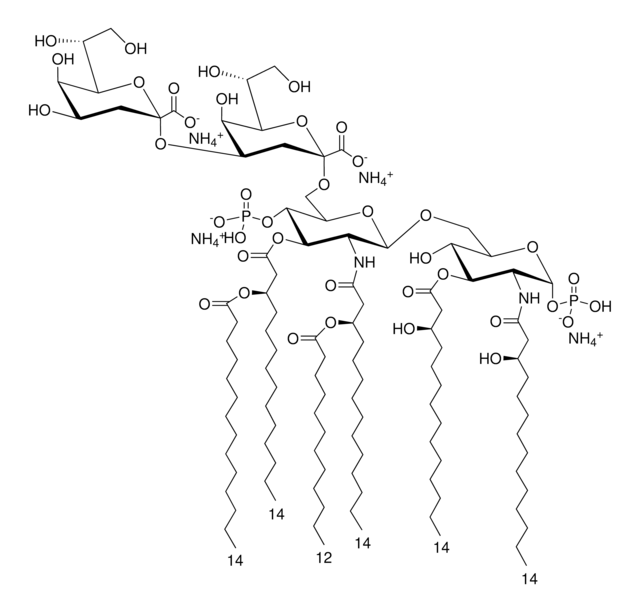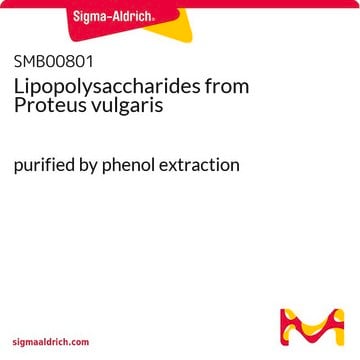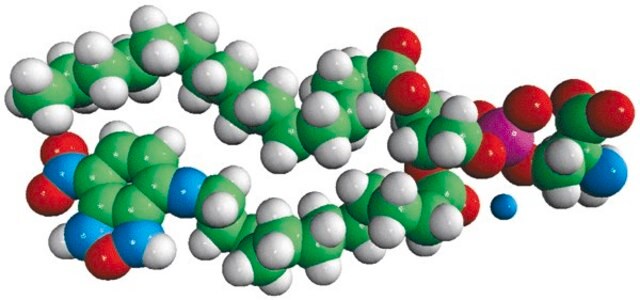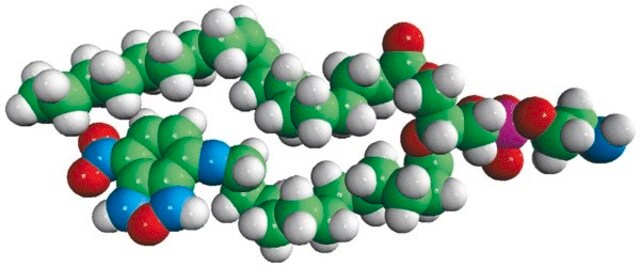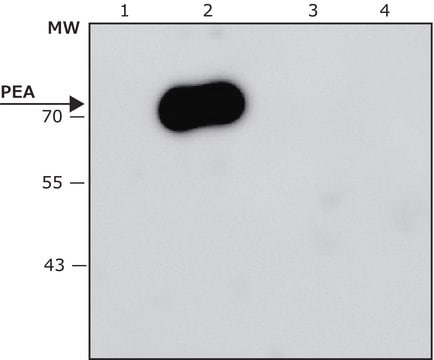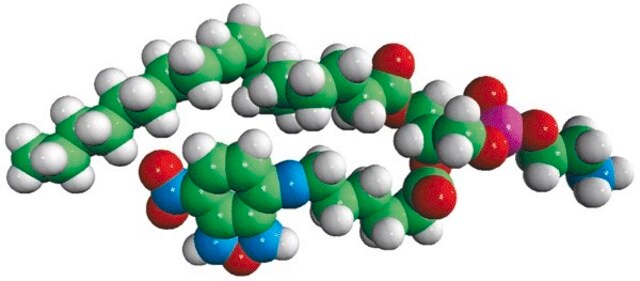810154P
Avanti
16:0-12:0 NBD PE
Avanti Research™ - A Croda Brand 810154P, powder
Synonym(s):
1-palmitoyl-2-{12-[(7-nitro-2-1,3-benzoxadiazol-4-yl)amino]dodecanoyl}-sn-glycero-3-phosphoethanolamine
Sign Into View Organizational & Contract Pricing
All Photos(2)
About This Item
Empirical Formula (Hill Notation):
C39H68N5O11P
CAS Number:
Molecular Weight:
813.96
UNSPSC Code:
12352211
NACRES:
NA.25
Recommended Products
Assay
>99% (TLC)
form
powder
packaging
pkg of 1 × 1 mg (810154P-1mg)
pkg of 5 × 1 mg (810154P-5mg)
manufacturer/tradename
Avanti Research™ - A Croda Brand 810154P
shipped in
dry ice
storage temp.
−20°C
General description
N-(7-nitrobenz-2-oxa-1,3-diazol-4-yl) phosphoethanolamine (NBD PE) is a fluorescent probe localized at the membrane interface. It possess fluorescent NBD label attached to the headgroup of phosphatidylethanolamine (PE). PE is the parent compound for phosphatidylcholine and phosphatidylethanolamine synthesis and is mostly enriched in brain.
Application
16:0-12:0 NBD PE has been used in lipid extraction assay and in vitro phospholipid fluorescence resonance energy transfer (FRET) assays. It is suitable for the determination of enzyme substrate specificity of lipoteichoic acid synthase (LtaS).
Biochem/physiol Actions
Phosphoethanolamine (PE) plays a vital role in the prevention of tumor proliferation. N-(7-nitrobenz-2-oxa-1,3-diazol-4-yl) phosphoethanolamine (NBD PE) monitors the Red edge excitation shift (REES) phenomenon with the unique motional and dielectric properties it possesses.
Packaging
5 mL Amber Glass Screw Cap Vial (810154P-1mg)
5 mL Amber Glass Screw Cap Vial (810154P-5mg)
Legal Information
Avanti Research is a trademark of Avanti Polar Lipids, LLC
Storage Class Code
11 - Combustible Solids
Certificates of Analysis (COA)
Search for Certificates of Analysis (COA) by entering the products Lot/Batch Number. Lot and Batch Numbers can be found on a product’s label following the words ‘Lot’ or ‘Batch’.
Already Own This Product?
Find documentation for the products that you have recently purchased in the Document Library.
Theoretical Study of Phosphoethanolamine: A Synthetic Anticancer Agent with Broad Antitumor Activity
Lorenzo VP, et al.
Journal of Chemistry, 2016 (2016)
Application of NBD-labeled lipids in membrane and cell biology
Fluorescent methods to study biological membranes, 37-50 (2012)
Ouma Onguka et al.
The Journal of biological chemistry, 290(20), 12744-12752 (2015-04-02)
Phosphatidylethanolamine (PE) is a major cellular phospholipid that can be made by four separate pathways, one of which resides in the mitochondrion. The mitochondrial enzyme that generates PE is phosphatidylserine decarboxylase 1 (Psd1p). The pool of PE produced by Psd1p
Maria Mercedes Palomino et al.
Microbiology (Reading, England), 159(Pt 11), 2416-2426 (2013-09-10)
The probiotic Gram-positive bacterium Lactobacillus casei BL23 is naturally confronted with salt-stress habitats. It has been previously reported that growth in high-salt medium, containing 0.8 M NaCl, leads to modifications in the cell envelope of this bacterium. In this study
Jean E Vance et al.
Biochimica et biophysica acta, 1831(3), 543-554 (2012-09-11)
Phosphatidylserine (PS) and phosphatidylethanolamine (PE) are metabolically related membrane aminophospholipids. In mammalian cells, PS is required for targeting and function of several intracellular signaling proteins. Moreover, PS is asymmetrically distributed in the plasma membrane. Although PS is highly enriched in
Our team of scientists has experience in all areas of research including Life Science, Material Science, Chemical Synthesis, Chromatography, Analytical and many others.
Contact Technical Service